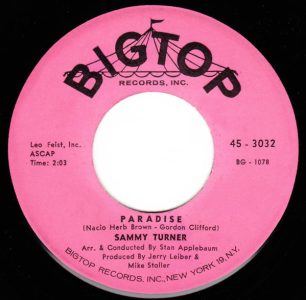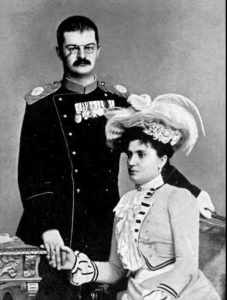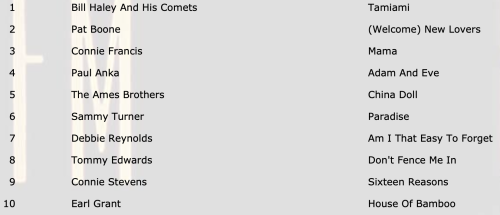#2: Paradise by Sammy Turner
City: Fort William, ON
Radio Station: CJLX
Peak Month: March 1960
Peak Position in Fort William ~ #6
Peak position in Vancouver ~ #24
Peak Position on Billboard Hot 100 ~ #46
YouTube: “Paradise”
Lyrics: “Paradise”
Sammy Turner was born Samuel Black in Patterson, New Jersey, in 1932. When he was 18, he put his dream of being a singer on hold and joined the U.S. Air Force and fought in the Korean War as a paratrooper. After the war ended in 1953, Turner worked as an accounting clerk, and sang at nightclubs at night. He was spotted by a talent agent who got Sammy Turner a record deal with Bigtop. He was being compared to the Platters lead singer Tony Williams, and Tommy Edwards. In early 1959, Sammy Turner and the Twisters released “Sweet Laurie Anne” – based on an 18th century poem written by William Douglas. The single was a Top 30 hit in Winnipeg, and a Top 20 hit in Buffalo. Turner went solo after this, and the Twisters became the Rivingtons who had a hit in 1962 titled “Papa-Oom-Mow-Mow”.
Turner’s next release was a cover of a 1949 Top Ten pop standard “Lavender Blue”, which was variously a hit that year for Sammy Kaye, Dinah Shore and Burl Ives. Turner’s remake in 1959 was a #3 pop hit on the Billboard Hot 100, and reached #2 in both Montreal and Toronto.
Turner’s followup release was “Always”, written by Irving Berlin in 1925, and a hit in 1926 for Vincent Lopez. The song had been featured in the 1942 film Pride of the Yankees, and the 1944 film Christmas Holiday. Turner’s version featured saxophone riffs by King Curtis. The single climbed to #19 on the Billboard Hot 100. “Always” climbed to #2 on the Hot R&B Singles chart, and #26 on the UK Singles Pop chart. The B-side was “Symphony” which was a hit in 1946 for Guy Lombardo and Freddy Martin. The B-side peaked at #82 on the Billboard Hot 100.
Sammy Turner next released “Paradise” in 1960.

“Paradise” was penned by Nacio Herb Brown and Gordon Clifford. Their composition topped the charts in 1932 by two acts. Both Leo Reisman (with vocalist Frances Maddux) and Guy Lombardo had number-one hits with the song. While Bing Crosby had a #7 hit with “Paradise” in 1932. It is a song about physical cues about romantic and sexual attraction. In this case, a woman’s desire being reciprocated by her male suitor.
1) She holds my hand, and then I understand, 2) her eyes afire with one desire, 3) a heavenly kiss, 4) she dims the light, 5) she holds me tight…
The lyrics infer sexual intimacy, but in a way that didn’t embarrass listeners at the time: “Her kiss, each fond caress, they lead the way to happiness. She takes me to paradise.”
The song first appeared in the 1932 film A Woman Commands, starring Pola Negri, a Polish actress who was a sex symbol in Hollywood at the time. She sang the following intro:
“I’m just a woman that loved a man,
but our house of love was built on sand.
Our love, it was grand, my love.
We lived and loved our days through,
but each night in dreams it started anew.
He comes to me as he used to do, my love.”
The film concerned Queen Draga (Pola Negri), who was nine years older than Aleksandar I of Serbia (played in the film by Roland Young). They were married from 1900 until June 11, 1903, when a group of army officers assassinated them. (The assassination is referred to in Serbia as “the May coup” as the dates of the coup in the Serbian calendar were May 28-29, 1903). Aleksandar was 26 and Draga was 35 when they were murdered. Aleksandar had met Draga in 1897 when she was serving as a maid of honor to his mother. Draga was nine years older than the king, unpopular with Belgrade society, well known for her allegedly numerous sexual liaisons, and widely believed to be infertile.

King Aleksandar I of Serbia and Queen Draga
Since Aleksandar was an only child, it was imperative to secure the succession by producing an heir. So intense was the opposition to the queen among the political classes, that the king found it impossible for a time to recruit suitable candidates for senior posts. The political story first made it to the screen in a 1920 silent film, Queen Draga. Twenty-nine years after their assassinations, the story continued to intrigue popular culture. To Queen Draga and King Alexander I their romance and subsequent marriage seemed like paradise. But Serbian army officers had a different view of things.
Ignacio Herbert “Nacio Herb” Brown was born in Deming, New Mexico, in 1896. In 1928 he was hired by MGM Pictures to compose songs for their musicals for the new medium of talking pictures. His first notable hit was “When Buddha Smiles” for Paul Whiteman & his Orchestra, which climbed to #2 in 1922. Nat Shilkret and the Victor Orchestra had a #6 hit in 1927 with “The Doll Dance”. “Avalon Town” was a hit in 1929 for Gus Arnheim & His Orchestra. That same year, “Pagan Love Song” was a number-one hit for Bob Haring & his Orchestra (and also a Top 5 hit for The Columbians). Brown’s “Singin’ In the Rain” was a #1 hit later in ’29 for Cliff Edwards, and a Top 5 hit for Earl Burtnett & his Los Angeles Biltmore Orchestra. (The song was the centerpiece in the 1952 film Singin’ In the Rain where Gene Kelly danced to the song in the rain. It was also a #1 hit for Mint Royale in the UK in 2008). In addition, Leo Reisman and His Orchestra had a #1 hit with “The Wedding of the Painted Doll”. “You Were Meant for Me” was a #2 hit for Nat Shilkret, and “Chant of the Jungle” was a number-one hit for Roy Ingraham & His Orchestra in ’29 and a #3 hit for Nat Shilkret in 1930.
In 1929, Nacio Herb Brown wrote music for his first musical film, The Broadway Melody. It was the first of 19 musicals he composed tunes for, the last being Singin’ in the Rain in 1952.
In the 1930s, Nacio Herb Brown had more Top Ten successes with “Should I” for the Arden-Ohman Orchestra (#3 in 1930); “Eadie was a Lady” by Ethel Merman (#8 in 1933); “Love Songs of the Nile” by Leo Reisman (#7 in 1933); “Temptation” by Bing Crosby (#3 in 1933) – which was later a number-one hit in 1947 for Red Ingle and the Natural Seven, and a #1 hit for the Everly Brothers in the UK in 1961; “All I Do Is Dream of You” by the Jan Garber Orchestra (#1 in 1934); “I Got A Feelin’ You’re Foolin” by the Dorsey Brothers Orchestra (#3 in 1935); “You Are My Lucky Star” which was a hit for the Dorsey Brothers (#2 in 1935), and also for Eddy Duchin and his Orchestra (#1 in 1935); “Alone” by Tommy Dorsey and His Orchestra (#1 in 1936); and “Would You” for Henry King (#4 in 1936).
Brown wrote the theme music for all 52 episodes of the TV show Hopalong Cassidy (1952-54), and 23 episodes of the TV show The Millionaire. Each episode followed a millionaire who indulged himself giving away $1 million apiece to people he’d never met. Nacio Herb Brown died at the age of 68 in 1964 after battling cancer.
Gordon Clifford was born in Rhode Island in 1902. He wrote music for Bing Crosby and the Rhythm Boys in the 1920s when they appeared at the Coconut Grove. Clifford wrote music for Hollywood musicals in the 1930s. In addition to “Paradise”, he is known for “It Must Be True” by Earl Burtnett and His Los Angeles Biltmore Orchestra (#13 in 1930), and another Top 20 hit by that band titled “I Surrender, Dear” in 1931. He died in a car accident in 1968 at the age of 65.
“Paradise” peaked at #1 in Scottsboro (AL), #5 in Wheaton (MD), #6 in Fort William (ON), Mount Vernon (WA), and Oklahoma City, #7 in Marshall (TX) and Denver, #8 in Pittsburgh and Jacksonville (FL), #9 in San Francisco and Birmingham (AL), #10 in Washington DC, #11 in Oceanside (CA), #12 in Baltimore, #14 in Cleveland and Newport News (VA), #16 in San Antonio (TX), and #17 in Syracuse (NY) and Boston.
“Paradise” has also been covered by Frank Sinatra, Dorothy Lamour, Helen Forrest, Eddie Fisher, Patti Page, Jerry Vale, Nat “King” Cole, Vic Damone, Lena Horne, Frank Ifield, Dinah Shore, and Nino Tempo and April Stevens.
In 1960, Sammy Turner appeared in concert in Montreal and Toronto.
Following “Paradise”, Sammy Turner released a cover of the Weavers chart-topping 1950 hit “Goodnight Irene”. In late spring 1960, the single was a Top Ten R&B hit in Bethesda (MD) and Washington DC. It was also a Top Ten pop hit in Oklahoma City. However, it didn’t make the national pop or R&B charts. Turner released another seven singles on the Bigtop label until 1961, with each one failing to crack either the national pop or R&B charts. Turner toured in 1962 and 1963, but did not record any new material.
In 1964, Sammy Turner switched to Motown where he released a cover of the Platters “Only You”. The single was a flop. In 1965, he signed with 20th Century Fox/ABC. Turner’s cover of the 1945 Frank Sinatra song “The House I Live In” also was a commercial failure. Sammy Turner switched to another label in 1966, and on Verve Records he released two singles. By this time the British Invasion, the surf sound, garage rock, new soul and R&B trends were in vogue. No one was interested in giving a late ’50s teen singer another listen.
In the ’70s, Sammy Turner worked as a background singer, contributing to albums by Donny Hathaway (Donny Hathaway) in 1971, Roberta Flack on Quiet Fire in 1971, and Aretha Franklin on Young, Gifted and Black in 1972.
In 1978, Sammy Turner released a final single on the Millennium label. He turned 92 in June, 2024.
November 29, 2024
Ray McGinnis
References:
“Sammy Turner,” From the Vaults, June 2, 2015.
Michael Jack Kirby, “Sammy Turner: Lavender Blue,” Wayback Machine.
“Nacio Herb Brown Dies at 68, Composer of Many Hit Songs,” New York Times, September 30, 1964.
“Gordon Clifford, Songwriter, Dead in Traffic Crash,” Stockton Evening and Sunday Record, Stockton, CA, June 12, 1968.
Pola Negri, “Paradise“, A Woman Commands, RKO Pictures, 1932.
King Aleksander I (Roland Young) tries to assure Queen Draga (Pole Negri) there’s nothing to worry about (excerpt) A Woman Commands, RKO Pictures, 1932.

CJLX 800-AM, Fort William (ON), March 19, 1960

Great write up on Sammy Turner. As to the song “Paradise” it’s one song I never liked no matter who sang it.